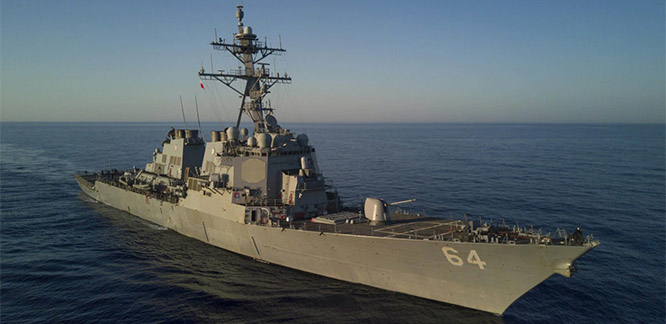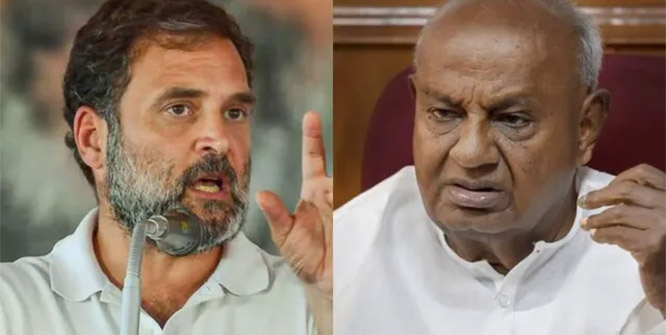Ras Tanura, Jun 17: This port, on the calm blue waters of the Persian Gulf, operates with military-like precision. Black and red-hulled super oil tankers must ask for permission to load months in advance. Detailed records go back 30 years to trace any vessels that have broken the rules by dumping oil or using substandard equipment. High-tech radar constantly scan for potential troublemakers, like boats sent from Iran.
At the top of the hexagonal control tower, staff dressed in neat white uniforms with officers' epaulets keep watch, looking over the sweep of countless storage tanks and ships. "If a target tries to hide behind a ship, we can see him," said Salah al-Ghamdi, the chief pilot at the facility.
Thousands of ships depart these waters annually, transporting the wealth of crude beneath the Saudi Arabian desert to gas-guzzling nations. The kingdom accounts for almost one-sixth of world oil exports, and even a minor disruption here could send shudders through global markets.
The state-run oil giant that operates the port, Saudi Aramco, is the economic force behind Saudi Arabia's transformation into a regional powerhouse. The deep oil reserves, which the company extracts, transports and sells, have made the country an important part of a geopolitical equation that includes the United States, China and Russia. Leveraging its engineering expertise, Saudi Aramco has built schools, roads, hospitals and much of the other infrastructure that girds Saudi society.
As the kingdom prepares for its next evolution, Saudi Aramco is again central — in a role that leaves the company and the country at risk.
The Saudi crown prince, Mohammed bin Salman, has unveiled an ambitious effort called Vision 2030 to wean the country from its dependence on oil and overhaul the economy. As part of his plan, he wants to sell a piece of the state oil giant to the public, in part to raise money for other investments.
It is one of the mostly highly anticipated initial public offerings, which Salman estimates could value Saudi Aramco at $2 trillion. But a stock sale leaves the opaque company more exposed to outside forces, a compromising position for a political beast with a powerful hand over prices at the pump.
With global prices north of $70 a barrel, Saudi Arabia and its oil giant are under pressure to increase production. It could put them at odds with some other nations in the Organization of the Petroleum Exporting Countries (OPEC), which meets this week.
"Saudi Aramco has always carried the kingdom on its back," said Jim Krane, an energy and geopolitics fellow at Rice University's Baker Institute. "But to support the kingdom in the coming decades, it needs to transform itself."
In essence, Salman wants the kingdom and Saudi Aramco to plan for the day far in the future when the oil age draws to a close. The present is already making the crude business look less attractive. Countries around the world are shifting to renewable power, while technological advances like electric cars are eroding demand for oil.
To diversify, Aramco is building vast new facilities that will turn crude into more profitable petrochemicals, and it is increasingly drilling for gas. It is also working with Google to establish data centers in the kingdom to develop data-analytics and cloud-computing capacity.
But the IPO will draw scrutiny to a company whose inner workings have long been kept out of sight. Pressure from investors, combined with a prince in a hurry to transform his country, could jeopardize the long-term approach that has made Aramco a dominant force.
For two years, a special team has been working with an array of Western bankers and advisers, preparing for how to handle quarterly reporting of results and coordinate trading between stock exchanges. A local Saudi listing seems certain, but London, New York and bourses in Asia are still in the running for a piece.
Amin H Nasser, Aramco's chief executive, said in an interview that the company was preparing to list in all those locations. Speaking with a picture of Salman in the background, he added, "It makes us ready for any market the government decides."
The 'Golden Ghetto'
Othman al-Khowaiter was born in 1933, the same year that Standard Oil of California secured a sweeping oil concession from the founder of Saudi Arabia. The Khowaiter family was made up of poor farmers, and as a child, he worked as a houseboy. He would follow the same path as the country's nascent energy business.
The founder, King Abdulaziz ibn Saud, needed cash to run his country, created from a patchwork of tribes. The US company, the predecessor to what is now Chevron, paid him 50,000 British pounds' worth of gold for the contract. The company sent teams of US geologists to explore Saudi Arabia's deserts, accompanied by Bedouin guides and soldiers from the king to ward off raiders.
Lacking today's sophisticated tools to find oil and gas underground, they interpreted clues on the surface — fossils, domes and folds in the rock — that hinted oil may be trapped underneath. One geologist, Ernie Berg, noticed that a wadi, or ancient riverbed, took a mysterious turn. He surmised that the bend had been caused by a large uplift, indicating an underlying oil field.
It led to the 170-mile-long Ghawar field, which remains by far the world's largest oil discovery. Such finds altered Saudi Arabia's prospects. After a pause during World War II, money started coming in, and jobs were suddenly on offer for the new company, the Arabian American Oil Co., or Aramco.
Aramco soon became a magnet for men like al-Khowaiter. In a society that had long been defined by tribal connections, the company modeled itself as a meritocracy offering young hopefuls the chance for advancement. Al-Khowaiter spent several days in 1949 crossing the country, hitching rides with passing trucks from his home in central Saudi Arabia, to Dhahran on the eastern coast, where Aramco was ramping up its operations.
"I heard about people working for Aramco, that the door was open to getting an education," al-Khowaiter said, over tea and pecan pie.
Back then, Al Khobar — now a major port near Dhahran — was a medieval-looking walled town that lacked the facilities, roads or people needed for an international oil hub. Saudi employees there lived in palm-thatched huts and were plagued by diseases like malaria.
Al-Khowaiter, who was sent by the Saudi government to study petroleum engineering at the University of Texas, eventually spent 35 years at the company, rising to become vice president for drilling before retiring in 1996. He still lives in Dhahran, now Aramco's headquarters, in a gated community dotted with date palm trees known as the golden ghetto, a wealthy enclave with a Mexican theme restaurant and a golf course, among other entertainment.
Stories like al-Khowaiter's are common, the most famous being Ali al-Naimi's. Al-Naimi, the son of a pearl diver and his Bedouin wife, began studying at an Aramco-sponsored school, and was first hired by the company as an office boy at 12 years old. He embraced US culture, even learning to play shortstop in baseball, and pestered the company to send him abroad — first to Beirut and then to the United States, where he earned his undergraduate and master's degrees.
In 1988, al-Naimi became Aramco's chief executive, the first Saudi in the position. In 1995, he was named Saudi Arabia's oil minister.
"Without Aramco, I don't know what life would be," al-Khowaiter said. "We would not be at the level we are now."
A unique long view
Aramco's path has long been driven by politics. Riyadh's relationship with the United States frayed during the Arab-Israeli war in 1973. Washington supported Israel. In retaliation, Saudi Arabia and other Arab states imposed an oil embargo on the United States. That same year, the Saudis took a 25 percent stake in Aramco, eventually gaining full control by 1980.
The US influence is still apparent. Many expatriates stayed, and US companies kept buying and selling Saudi oil. Unlike the rest of Saudi Arabia, where recreation and entertainment are largely forbidden, Aramco compounds have baseball diamonds and movie theaters. Men and women work together and mingle in public. English is widely spoken.
Saudi Aramco's success, in many ways, is tied to its roots. It is run more like a private company than a state-run fief, with top executives typically chosen for competence rather than connections. Its employees are efficient, skilled and highly educated, making Aramco an outlier in a kingdom where state control has stifled innovation and limited the kinds of opportunities that should be available in such a wealthy country.
The company is widely praised for embracing technology and, unlike many government-controlled energy companies, finishing projects on time and on budget. While Aramco does not disclose its financial results, analysts say its large, long-running fields most likely mean that the costs of bringing the oil out of the ground are among the lowest in the industry. Rystad Energy, a Norwegian market research company, estimates Saudi Aramco's operating costs to be $4.88 for each barrel of oil. Last year, Exxon Mobil reported worldwide production costs of $10.12 a barrel.
Its Saudi parentage gives the company an advantage over the likes of Exxon and Royal Dutch Shell. Aramco doesn't face the relentless quarter-to-quarter pressure to produce profit. It can take a really, really long-term view, and over the years has persistently opted for the most advanced — and expensive — technology to ensure it will be able to pump vast quantities of oil for decades.
"Saudi Aramco has a much better business model than the international majors," said J. Robinson West, chairman of the BCG Center for Energy Impact, a consultancy.
When Aramco first drilled at the Shaybah oil field in the 1990s, it picked a then unusual and costly process known as horizontal drilling. Rather than exploring straight down into the ground, Aramco's wells lace through Shaybah. One has so many branches it is known as the fish bone.
They more than compensate for the cost, though. During the process, the wells have more contact with oil-bearing rocks to produce more crude, while expending less energy on pumping.
This approach is one reason giant fields like Ghawar continue to produce despite having been tapped for decades. Fields in areas like the North Sea in Europe, or in the Gulf of Mexico, have declined sharply.
"Saudi Aramco has the longest time horizon in the industry," said Daniel Yergin, an oil historian.
With oil reserves pegged at about 260 billion barrels — far more than any publicly listed competitor — Aramco has around 70 years' worth of resources at present production levels. It has the two largest oil fields ever discovered. And more are coming, with the recently developed Manifa capable of producing 900,000 barrels of oil a day. Western oil majors only rarely get access to such giant deposits.
"We are in a unique position where we have exclusive access to all of Saudi Arabia's fields," said Suha Kayum, an Aramco research scientist. "We basically develop our fields to last for centuries."
Change is coming
About an hour's drive from Dhahran, a gargantuan industrial complex dominates the desert landscape. Two square miles, it looks like a small city, except people are eerily absent and the streets are lined with pipes, storage tanks and smokestacks. Sadara, as this complex is called, represents what could be the new Aramco.
The ambitious project, which began operating last year, is the result of a $20 billion investment by the company and its partner, Dow Chemical. In all, 26 plants brew an array of petrochemicals from oil and gas for foam, insulation and plastics, as well as chemicals that will go into adhesives, coatings and cosmetics.
The idea is not only to feed expanding world markets for these products, but also to sow the seeds of a diversified Saudi economy. Officials hope Sadara will drive growth in industries like furniture and car parts, providing jobs to the country's young and fast-growing labor force.
"We see the world changing," said Abdulaziz al-Judaimi, Aramco's senior vice president for chemicals and refining. "It is very much for us to read the future, and engineer our future in a way that we keep our market share."
Aramco is separately trying to up its output of natural gas. Past policies and Saudi geology have left the kingdom surprisingly short of gas, which is increasingly used in electricity generation. The company is even on the hunt for international gas deals that could bring fuel back to Saudi Arabia, a role reversal for one of the world's most dominant exporters.
But whether politics and profits can peacefully coexist in this blend is a big uncertainty for Saudi Aramco.
Investors in a public Saudi Aramco may want to know why the company has research centers across the globe when others have been cutting back.
They might question why the company needs to lend executives and engineers to the government to carry out pet projects for the kingdom, like building a university on the Red Sea.
Or they might wonder why Saudi Aramco maintains as much as 2 million barrels a day of spare pumping capacity for the country to intervene in world markets, an amount equal to the total oil production of Nigeria.
"They have a gold-plating mentality," Floris Ansingh, a former head of Royal Dutch Shell's operations in Saudi Arabia, said of Aramco. "They are very demanding on the technical side. They act like a rich company."
After a public listing, he said, "this mentality has to go."








Comments
Add new comment